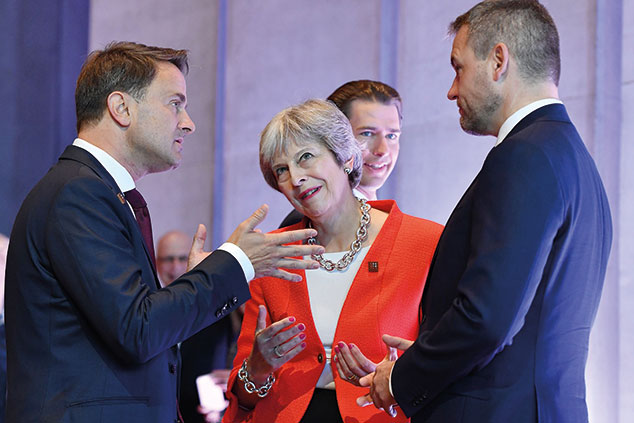
“Like many divorces,” the struggle between the European Union and the United Kingdom has become increasingly bitter, says Walter Russell Mead in the Wall Street Journal. At last week’s EU summit in Salzburg, the assembled nations “contemptuously brushed aside” Prime Minister Theresa May’s Chequers Brexit plan.
If there is no deal by 29 March 2019, “onerous trade barriers will snap into place”. Not that their response should have been a surprise. To many Europeans, the Chequers deal looks like cherry-picking. EU leaders also reason that if secession is made too easy, others will follow.
Why Salzburg doesn’t matter
Unfortunately for May, Europe is having an “existential” crisis and punishing Britain is one of the few things EU members can agree on, says Iain Martin in the Times. The Visegrad Four (Poland, Hungary, the Czech Republic and Slovakia) are hardline opponents of migration and in conflict with Brussels.
This division stems from “overreach” of an organisation that was “designed to foster European harmony” but stopped paying attentions to voters’ concerns. Now May faces the “daunting task” of having to “reset her Brexit policy” – but she can do so knowing that the EU is a “terrible organisation we should be glad to leave”.
Reframing Brexit as a “victim’s necessary escape from an abusive, domineering partner” is a cop-out, says Clare Foges in the same paper. What May needs is a “detailed, realistic plan” that answers the Irish border question, that “delivers for the UK economy” and “that will make it through parliament and win the agreement of 27 EU leaders”. And we’re not as far from an agreement like that as the “current heated reporting and controversy” implies, says David Allen Green in the Financial Times.
“The differences on the Irish backstop are over practice rather than principle.” We are still on schedule, even if the UK is “heading towards a form of Brexit” that “almost nobody” wants and that won’t be to our advantage. There are growing calls for a second referendum to steer the country back on to a more sensible course – but this unlikely. So Britain will cease to be member of the EU on 29 March, unless “something exceptional” happens. Salzburg is just another step towards that.
Not even close to a plan
So perhaps it’s time to look at the Institute of Economic Affairs’ “Plan A+”, unveiled on Monday, says Ambrose Evans-Pritchard in the Daily Telegraph.
This scheme, which has won the backing of leading Brexiteers including David Davis, Jacob Rees-Mogg and Boris Johnson, argues we should “ditch all talk of the EU single market and customs union, instead going global on multiple fronts in a quick-footed campaign” to forge trade agreements. This would end the “wrangling” over cherry-picking, and there would no longer be talk of “breaching the EU’s ‘four freedoms’”.
Yet the plan is based on “dubious maths” and “its conclusions cannot bear any weight”, says Chris Cook on the BBC. Even the pro-Brexit Democratic Unionist Party – who May relies on for her majority – slammed it as “vague and contradictory”, says the Belfast News Letter.
Overall, all it deserves is an A+ for idiocy, says John Crace in the Guardian. The only place where more Brexit nonsense was being spouted was at Labour’s party conference in Liverpool, where everyone seemed to agree that the whole thing was a terrible idea, yet the party leadership reckoned the solution lay in offering people a vote on a bad deal or an even worse deal. “Clowns to the left, jokers to the right.” And Britain remains stuck in the middle.